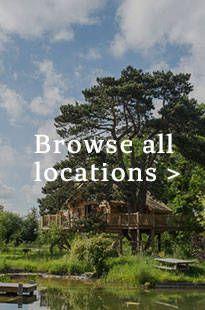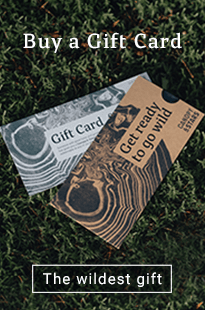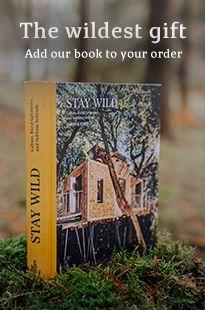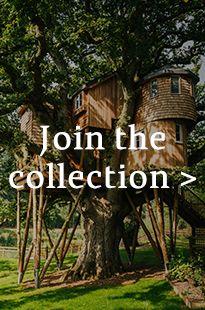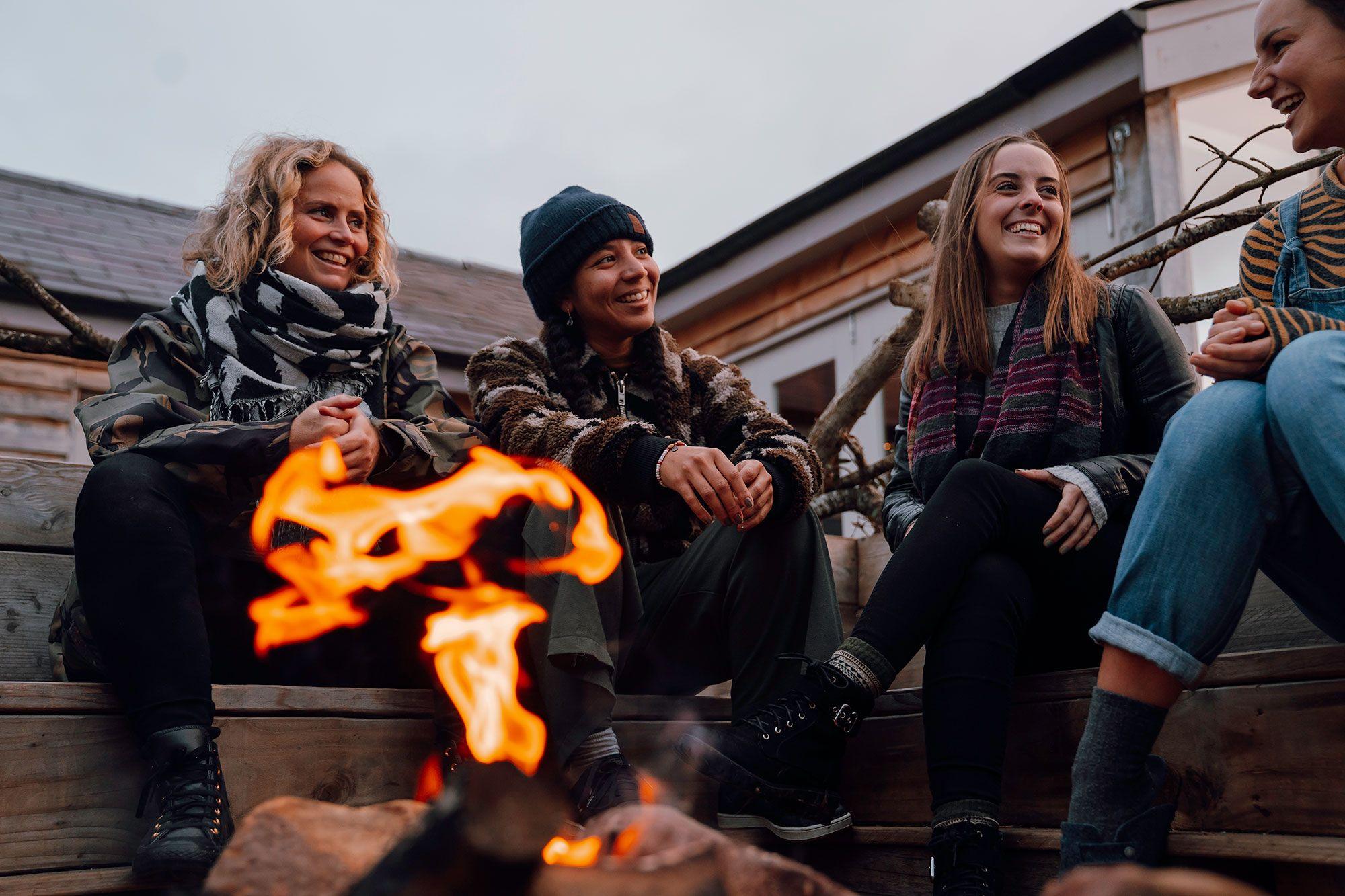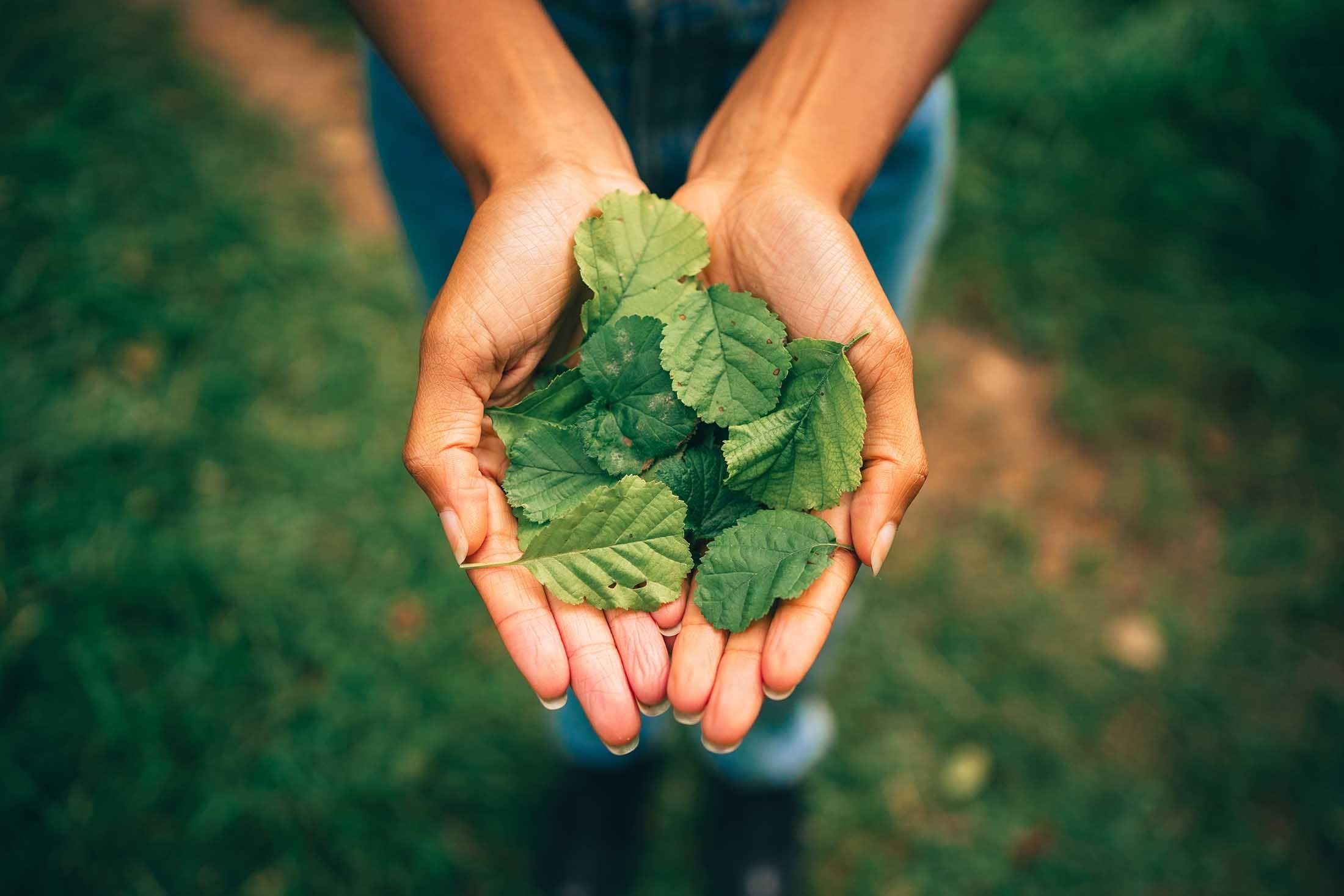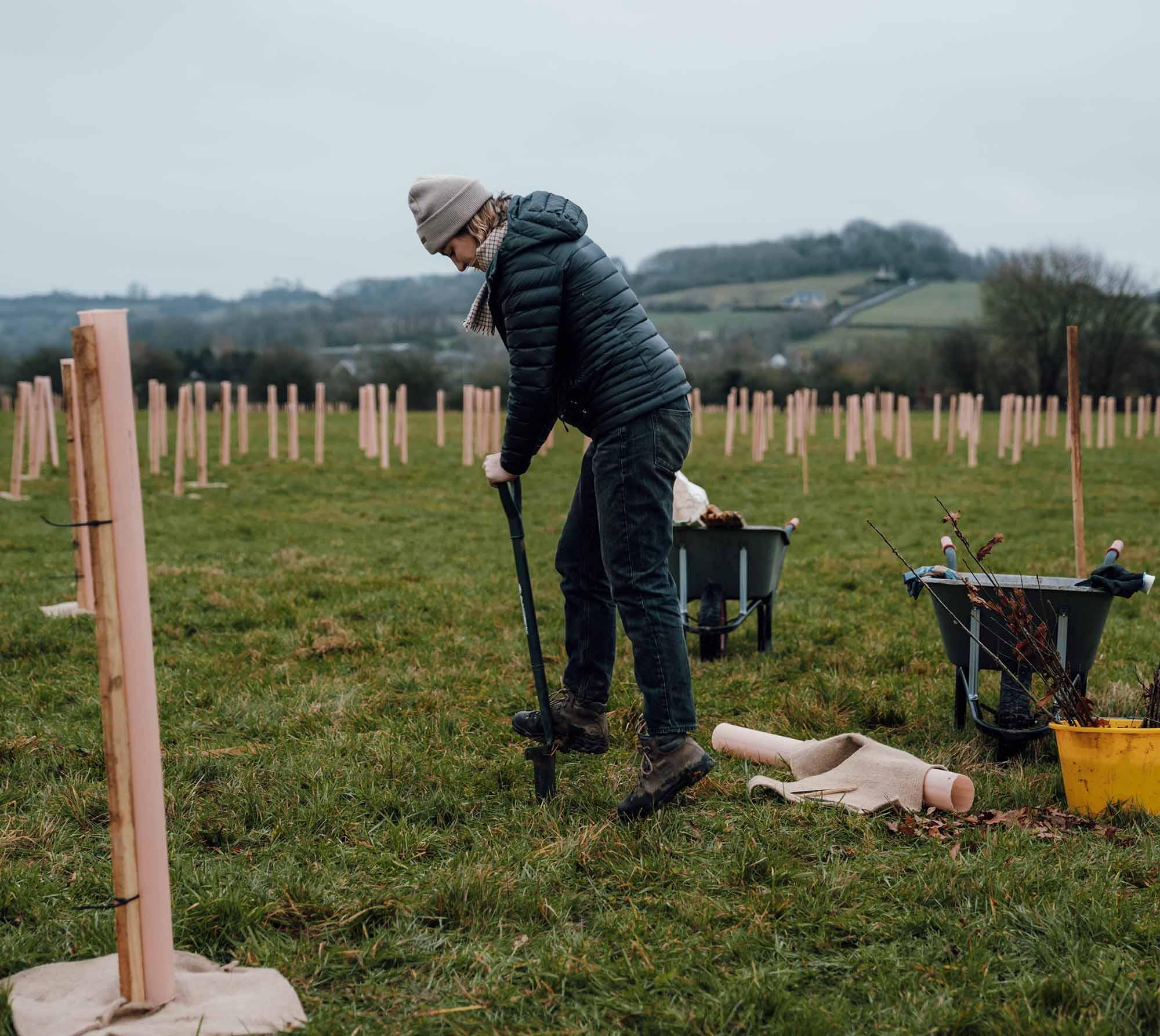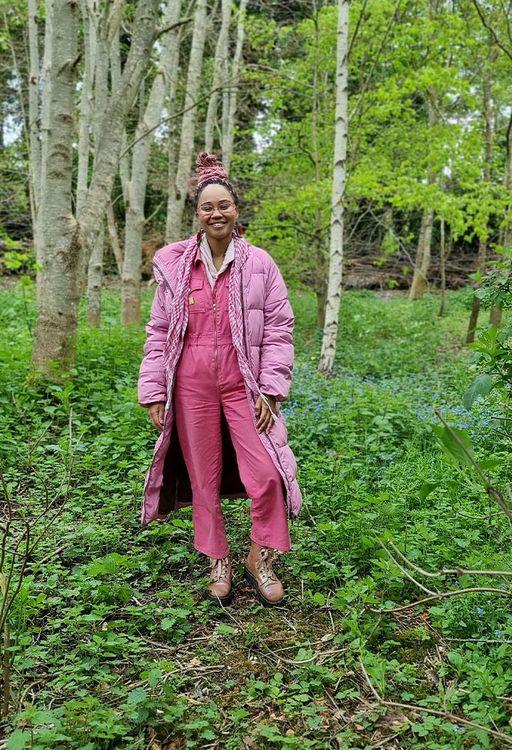
A life More Wild – Series 4, Episode 3
Mikaela Loach
Join Mikaela on an inspiring walk to the site of the Stanmer Park Glencore protest
When her grandmother's local beach disappeared beneath rising seas, Mikaela Loach felt the full emotional impact of climate change. Years later, she gave up studying medicine to become a full-time campaigner for the racial and environmental change that she sees as the way forward for the world.
I think that people don't realise that every transformational change that has ever happened in history, was looked at before, as being impossible. ‘Never, it's never gonna happen. Oh, just give up on it. Like, that's idealistic. That's ridiculous.’ And as soon as it happened, history is rewritten as if, everyone knew it was gonna happen, like it was coming, that people could feel the change coming. So, the things that seem impossible now, are not impossible. We need everyone to come on board and we need everyone to come with us. And we need to not leave anyone behind.
I'm Chris from Canopy & Stars. And this is A Life More Wild. You join Mikaela now in Stanmer Park, the site of a protest organised by Resist Glencore, the group taking on one of the largest mining companies on the planet.
We're in Stanmer Park, and we're about to make our way to my friend Rafa’s plot, and I’ll tell you a bit of a story about why that's important.
I think it's just pretty amazing that there's a park that is so big and like alive and, almost very diverse in the amount of nature that's here, so close to a city. And it feels like an escape from the city, which feels really lovely. I've been here a few times, for lots of different things, like we've come in, like made placards and posters for sort of campaigns been working on like, in the park. And it's been really lovely to be able to do that in a nature space and not just be doing it in people's flats all the time. I think it's just yeah, it's a place where I feel quite connected to the earth and where I also feel like I can shut off my like, very intense brain, from all the busyness of the campaigning stuff, and just remember what we're, part of what we're trying to protect as well. So that feels important.
Um, we're heading to my friend Rafa's plot. Rafa is an Afro-Colombian man who's lived in Brighton for quite a long time. And he has this plot of land here that he uses to do his like, carving work. He also often like offers up the space for lots of different community events. And one of those events was, a big event that we did for two indigenous leaders from the Yukpa community in Colombia, to come across the whole of Europe, and to tell their story of their struggle, and to try and get more people on board. Because basically, Glencore which is a massive mega mining company, they run and own a mine, called El Cerrejón, which is the largest open pit coal mine in Latin America. And it's bigger than Paris, which is, like obscene to think about that. It's just a coal mine. And it's on the land of the Yukpa and the Wayúu people, these two indigenous groups who have lived on this land for generations, literally live off the land and have these kinds of, cultures of symbiosis for so long, until Glencore comes along, and rips up and destroys the land, poisons the water. And then also involved in a lot of violence against these communities if they try and resist. And it's important to note that Glencore have their head offices, and the headquarters in Europe.
So, we wanted to kind of challenge people on this notion that we are separate from these impacts that are happening, that makes you think that they're happening further away. Because in reality, if the concentration of wealth is happening here in the Global North, we have responsibility over the companies that are causing that harm, and extracting that wealth away from communities further away. So, at this plot, as Esneda Saveedra and Chiche came, they told their story of how more than 40 children every year in their communities are dying because of the water being poisoned because of the pollution. So, they came they told us the story we had they did a ceremony for us. They talked a lot about how in the Global North we've become so like disconnected from nature. We don't like ask the earth for permission when we take things from her. We don't feel this like connection that I think a lot of other indigenous communities do you feel. And so they did this whole ceremony for us. And they also had brought corn seeds from their territories. And they gave them out and asked us to like to keep them. They blessed them. And they wanted us all just to think about the fact that, we can learn a lot from their indigenous cosmologies in how we learn and how we act, here, but also, that the fight for climate justice, the fight to really transform our world, should not just be left to them in their territories, we have a lot of a role to play as well.
I think it's important that there's a difference between having like radically transformative politics, and politics that are alternative. And I think that tbeach And I think that a lot of this space in this event was to challenge people to be like, changed and passive is an active process that requires participant. And it actually requires us to go beyond just thinking things or caring about things, but to do something. And that doing things can be, it could be, being a part of this Resist Glencore and really trying to challenge this mega mining company, in really material ways. Not just like thinking they're bad. But like how do we damage their social licence to exist? The fact that lots of people don't know who they are, the fact that they're still able to get government subsidies, the fact that like, people think that maybe they're still necessary, how do we challenge that materially? How do we think strategically? How do we do that? Rather than just, I read all the right books, therefore, I'm good, and therefore that's enough. It's about how do we change the common ground? How do we really like disrupt these systems, rather than just think about them. And that was a lot of what this space was for. And it was really, I think it's really beautiful to be able to host it in nature. And it was beautiful that like a few hundred people turned up. I think it's even just like really healing for a lot of people to be surrounded by birdsong, and covered by trees, and sat around a campfire together. And to really, like feel like we've been, kind of shaken out of our normal life, I do think a lot of us need a bit more of a shaken up, sometimes. So, it was great to be, be part of doing that here.
At school, I don't know about you, or anyone else listening. But I was taught that, that like, for example, that the enslavement of people ended, because some, like nice, white man thought, ‘Oh, this is actually really bad.’ Like you read about it and thought this is really bad, this is harmful, and then wrote some nice letters and did some like things and gave some speeches. And that that ended it. Whereas at home, I was taught from my Jamaican family of ‘Oh, you know, enslaved people's rose up and enslaved people's like, had armed resistance. And also, people damaged the sugar industry so that people couldn't have sugar, so that it wouldn't be possible for the industry to continue. Like there was, it wasn't just a moral change. It was a very, like material change that came from people. But I think if you're just taught that, ‘Oh, it's just the exceptional heroes who said nice things and change people's minds. And that's how change happens.’ then you think, ‘Okay, along with the climate crisis, all I have to do is change the minds of people who are already in power, all I have to do is, you know, talk to oil and gas companies and ask them to kindly move to renewables’, you're not being told how change really happened, that change actually happened through like, a huge amount of disruption, through a huge amount of invisible-ised work. And then therefore think that you feel disempowered, because you've been asking people to change, they're not changing and you're thinking ‘this is what I've been told is the way to do it. It's not working.’ but actually think it's just remembering that, it's in these companies in a lot of like power systems, best interests, for us to not understand how change really happened. And I think it’s just really important that we actually do like, take the time to like learn about history and how did it really happen and like, like learn from the communities who resisted, like learn from them directly. Actually, you're not just relying on our like schooling system to have taught us everything of how it really happened, and being open to being challenged, and knowing that. I don't know, we don't know everything. And there's so much to learn. And that's exciting. And it's not, it doesn't have to be something that is this like personal failing that we didn't know it, it's instead it's like, ‘Oh, there's so much we can know – that's really exciting.’
This like better world that we're all hoping for. And I do believe that you all of us, in some way are hoping for it. It hinges upon people who currently believe certain things or currently have ideas of the world, in certain ways, changing those ideas and changing like how they see the world and also being given space to change that, like Adrienne Maree Brown said that we don't want movements that are like prisons with high barbed wire fences, that the barrier to entry is so high that no one can ever come in.
We want movements that are like a sanctuary, spaces where people who have harmed and been harmed have space to grow, and to change and to be transformed. And I think we could do a bit better about being honest with our own journeys, because you know, none of us like lept from the womb as these like completely unproblematic, amazing people like, that's just not true. But then we frame ourselves like that, because we're too scared of being ousted or too scared of being seen as bad because we have these ideas of good and bad being a binary or that you sit either camp. But actually, all of us are a mix of like good and bad and everything in between. And I just think we could just do a bit better to allow people like the dignity of having a journey. And they won't feel as judged because I think a lot of people are too scared to even like step out because there's like, ‘Oh, well, I won't be allowed in these spaces, I won't be welcomed.’ I'm not that. And if there's no space for people to change, we're never gonna change the world either.
I think my dad actually isn't that surprised of all of the stuff that I'm doing now? Just because I think it was a kid that would always just be like, ‘Why? Why? Why?’ I must’ve been so annoying, but I think I always looked at the world and thought, like, ‘A lot of this isn't making any sense, I want to do something about it.’ And at first, the doing something about it, like being a doctor and going to medical school. And that's what I wanted to do. And that's what I did do, but then just chose not to practice medicine anymore. Because I found that actually, I think we can cause a lot more change if we kind of…
… okay, there's this easy analogy. So, there’s a stream, people further downstream drinking water, and that's their water source. And they're getting like sick a lot, they're vomiting, they're having diarrhoea. And a doctor plays an important role, which is to go and like give these people medication to keep them alive, like to stop them from dying in the moment. But if you just look further at the stream, there's someone who is like putting poo in the water. What I see my role as now is going further upstream and trying to stop people from getting sick in the first place. Most people in in our world are sick, not just because of like, you know, these kind of arbitrary forces of germs are something, people are sick because of social inequalities. And they're sick because of systems that make people unwell. And if we can tackle those systems, then we can actually make a world where all of us have good health.
When I would see things on the news, and I’d get upset about them as a kid, because they wouldn't, I think I'd like sneak in, and try and, you know, because I wouldn’t know what was going on, but I had like a very soft heart, I still do. And it would break very easily. And so, I remember one time during the Boxing Day Tsunami, that a lot people will probably remember, I was about five at the time. And I saw these pictures of kids that look just like me, like the same age as me, who had been displaced from their homes, like complete destruction. And I felt really heartbroken about it. And then my parents noticed that I had like, snuck down into the room and was crying and they sat me down, Iike checked I was okay. And then my dad asked me a question, that I think is like stuck with me the rest of my life. And he just said like, ‘If you care about this, what you can do about it? And what do you think you can do about it?’ And he wasn't trying to be like, you know, ‘at five I need to stop scenarios are happening.’ Because that's like, not possible. But I think it was more of a posture, of when we see things that move us, we have, we do have the power to move them too, we do have the power to do something about them. We don't have to just sit and watch things happening. And just be like, ‘Oh, that's really sad. Let's move on.’ And we can choose to be active in the face of them. And also that you don't have to just like sit in the doom and the sadness, you can transform those emotions into something that actually is useful. And so, I think as I just as I grew up, I just kept always asking when I saw things, ‘What can I do about this? Like if I'm moved by it, how can I move it?’ I think a lot of us could do with asking that question. A lot. I know that can seem really overwhelming. Because there's so many things to change. There’s so many things do things about. And it's not that we have to like, flip flop and switch between every single issue, I think it's more that we include an understanding of each issue into the action that we're taking. So, for me, what's really been useful is to, recognise that all of our issues are really interconnected. So the climate crisis is actually a direct result of colonialism, and like capitalism, so like the enclosures, colonialism, all these things came together to lead us to the climate crisis we're in now, I think when we recognise that all our issues and our struggles are connected, and when we do the work that we do, including the perspectives, all the different struggles, when we include Sudan, when we include Palestine, when we include the climate crisis, when we include Nigeria, when we include all of these different, feminism, everything, like we include all of it together, realising that all connected, then we can also, in our work, recognise that if we do it in a way that has this perspective, of everything's connected, then when the, the thread that we're pulling at, will unravel the entire cloth. And so, it's not that we have to just, you know, change all the time, it's more that we include, and like synthesise that into the action that we're doing, and recognise that to have a perspective and understanding of all of the interconnectedness of these issues, isn't to dilute the action that we're doing, it's actually to make it more possible for us to win all of these fights together in the end.
So, we're here at Future Roots now. It's Rafa’s plot, and around us are like Rafa’s carvings that he does. This is the space where, I mean, as we were walking, like down here, when we have the event, we have people like cooking food for people here, we had lots of people sat, there were workshops that happened, especially for kids that they could feel like they were engaged in, in what's happening. Because also for Esneda, she, she found it really impactful that there were young people here, because it's the next generation that are going to kind of continue this fight. And I think that also we underestimate how much kids are like taking in, I think, and so including them in the conversations, and not just giving them the conversations, but also making it so that these spaces are accessible for parents, I think is really important. Because sometimes, like, sometimes activity spaces can forget that people have different caring responsibilities, as well. So, it was really beautiful for it to, it felt like a space of that was really like energetic, in the sense that we were excited about what we could build and whilst at the same time grieving what is being lost.
I think all real change does actually come from the bottom up, in some way. But I just think it doesn't come from it being individualised, I think it comes from us recognising that we are like our lives interconnected to each other. And that, there are more of the people, than there are of the people in power. Like they're more ordinary people, than there are people in power. And actually, like if we come together, if we connect with each other, if we like, strategize and, and organise in particular, then we can cause really big transformation. So, it's not just about, especially when it comes to the climate crisis, I think people think, ‘What I need to do is, yeah, I need to recycle, and I need to, like, make my own oat milk. And I need to just focus on my lifestyle.’ I think it's really important that all of us realise that transformation is very much within our reach. But in the same way that all transformation happened before. It won't just happen. Like things don't just get better over time passively, like people have to make them better. And so, joining a group in your community, and whatever that looks like, organising towards a future where all of us get to live in dignity is really important, because it's the only way that we'll get it. We can't just like sit around thinking, the right things, we have to really like, we have to really do them. And we have to really build them and recognise that no hero is coming to save us, and we have to save each other and that we can. And that's really possible. And I think that's way more empowering than ‘just, you know, use less plastic and take shorter showers.’ Because whilst we do need behaviour change, we have to make that behaviour change accessible for everyone. And we have to also recognise that the majority of emissions come from the uber rich and from the fossil fuel companies. And most households do not have the power to actually reduce the amount of emissions they're making, because most of them are coming from the fact that we're locked into a fossil fuel energy system still, our houses are not insulated, and those two things will only change if we actually come together, organise and put pressure on for, like the kind of wholesale transformation that's needed. So, I think people just need to feel a bit more empowered and come together and organise.
I think I'm definitely still learning how to take care during this work. But I also want to say that I love doing the work that I do. I think that people always frame any work to create a better world as if it's this, like huge sacrifice each person is making, as if that they're doing it, like that is so hard, and like that everyone's really unhappy doing it. And I think that's just so counterintuitive, also to getting people to join. But it's also not true, like, don't feel like it has to be this, like competition about who is more burn out or who's a more rubbish time, means that your work is more valuable. That's just not true. Like you have, I think all of us have a lot to like gain from being parts of movements to change our world and to transform it. And I think that also leaning into community is something that's been really important to me, of not feeling like I have to do everything alone. I just think that we need to recognise that joy is so important. And that part of what we're fighting for, is a world where everyone gets to experience joy, where like, it's not just everyone's lives in dignity, but everyone, like enjoys their life. And therefore, I think we need to enjoy our lives on the way there as well. Because we should be living in pockets of the future that we want to live out on, and find the joy, hold on to the joy, and realise that it can power us forward.
If that's got you a bit fired up, then why not find a local group or join one of many organisations worldwide that's fighting for a better system. And try to remember, you don't have to do everything, just do something. Next time, we'll be talking about another thing that increasingly affects all our lives. Technology. We'll be walking with writer and broadcaster Emma Gannon, who's written extensively about the difficulties and opportunities of living in the Digital Age.
Follow Mikaela on Instagram to see what you can do to support worthwhile causes, or ourselves to see us working on the podcast and discovering great new places.
A Life More Wild is an 18Sixty production, brought to you by Canopy & Stars. Production by Clarissa Maycock. Our theme music is by Billie Marten.

